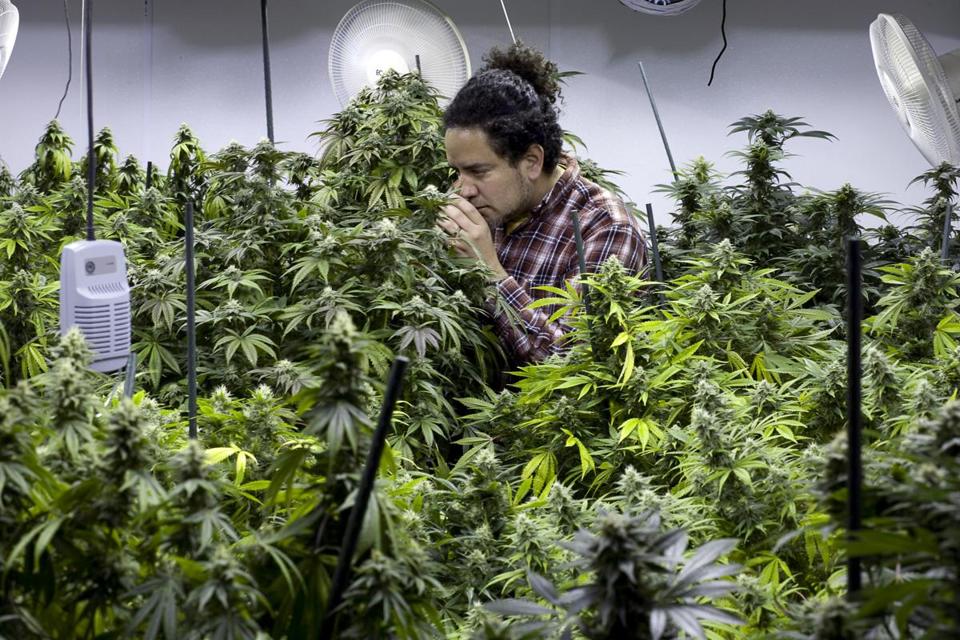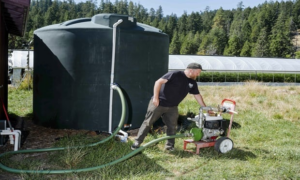
Pat Vasquez – Cunningham For The Boston Globe
As cannabis shifts from the black market into the world of legal, regulated business, the industry has experienced unprecedented growth in a short time. Entrepreneurs of all stripes – from cultivators to distributors to tech experts – have jumped into the fledgling industry to get a piece of the multi-billion-dollar pie. The rapid growth of the cannabis industry, in both medical and recreational markets, shows signs of continuing; in other words, cannabis is still on the ground floor.
If you’re considering starting a cannabis business, whether it touches the plant directly or provides support and ancillary services, now is the time to get informed and involved. This guide will serve as a primer to help you get the ball rolling on your own entrepreneurial cannabis endeavor so that you’ll be seeing plenty of green in no time!
The birth of an industry
Medical and recreational cannabis use is legal in a total of 26 states, plus Washington D.C. An additional three have decriminalized cannabis, reducing possession under certain amounts to a civil charge rather than a criminal one. The rash of legalizations began with California’s passage of medicinal cannabis measure Proposition 215 in 1996 and culminated in Colorado and Washington’s legalization of recreational cannabis in 2012. Since then, the dominoes have continued to fall, and now eight states, plus D.C., boast recreational cannabis use laws. In just 20 years, what was previously a black-market product has become the cash crop of a new industry.
However, as the cannabis industry rises to prominence – multiple estimates place anticipated growth eclipsing the $20 billion mark by the early 2020s – the federal government maintains cannabis as a Schedule 1 controlled substance. That means cannabis is considered an illegal substance with no accepted medical use and a high potential for abuse. Despite the federal prohibition, the governing document of the day is the Department of Justice’s 2013 missive known as the Cole Memorandum, which states the feds won’t interfere with cannabis operations that are abiding by their state’s legal framework. Unfortunately, the prohibition still causes problems for the fledgling cannabis industry, especially when it comes to financial housekeeping.
Still, even with this albatross around its neck, the legal cannabis industry is a burgeoning one. The Arcview Group, a cannabis investment and research organization, found that 2016 revenues from the young industry had eclipsed $6.7 billion, which represented a 30 percent increase over 2015 sales.
Furthermore, Arcview projects that by 2021, the industry will bring in $21 billion. That’s a whopping compound annual growth rate of 20.97 percent if the projection holds. No wonder investors and entrepreneurs alike are clamoring to get some skin in the game.
A variety of business
With big numbers like $6.7 billion in sales in 2016, you might be thinking the window of opportunity has mostly closed, but industry insiders told Business.com that it’s still early in the game. Stuart Titus, Ph.D., president and CEO of industrial hemp company Medical Marijuana Inc., said startups of all stripes still have ample opportunity to launch, grow and succeed in the cannabis space.
“The whole industry itself is at the very ground-floor level,” Titus said in an interview at the Cannabis World Congress & Business Exposition. “We’re certainly nowhere near maximizing what we could do. Look at alcohol prohibition. All of a sudden, legalization spurred industries and businesses … We think the same is true for this industry.”
Cannabis businesses come in all shapes and sizes. Most people think of massive cultivation operations or dispensaries with jars full of shimmering, green buds. Those are certainly key elements of the industry; however, many cannabis entrepreneurs never even touch the plant itself. These include logistical support businesses, like distribution and transportation companies, or technology companies, such as dispensary software development or high-tech infrastructure for grow houses, for example.
Science is also a huge driver of the cannabis industry, much like other agricultural endeavors. Labs are needed for testing the potency and genetics of cannabis flowers, extractors are required for harvesting oils, and ongoing research provides insights into the specifics of cannabis for medical treatment. Glass blowers, vape purveyors and edibles creators are also in high demand. [Want to find out more about where the opportunities lay? Check out the tips from these industry insiders.]
“I believe there is plenty of opportunity. It’s the very, very early stage [for] everything from medicinal to recreational, support industries and infused products,” Titus said. “Creative minds, unique products and delivery methods will just continue to move along as time goes, and I think there’s ample opportunity for people to make a significant business opportunity in this incredible industry.”
Regulatory landscape
The state of the industry remains very much in flux. Beyond the federal prohibition, or perhaps because of it, varying state frameworks have led to a fragmented industry that looks very different based on geography. Everything from licensing to reporting can be vastly different between states, making it difficult for a company to expand simply. Experience gained in Colorado, for example, does not necessarily translate to the New York market.
“Since we’re not a federally recognized industry, there are many things that are affected,” said Sara Gullickson, CEO of DispensaryPermits.com, a consulting service for marijuana entrepreneurs. “In terms of regulations, every single state program varies. They’re crafting programs specifically for their environment. So, things that are important in Arkansas might not be as important in Ohio and so we’re seeing that kind of flesh out.”
As knowledge of the industry improves, newer markets are including mandates that don’t exist in older markets. For example, Gullickson said, Arizona’s legal cannabis program includes no mention of testing, while newer markets mandate testing to ensure that cannabis is a safe, quality medical product for patients to use before it hits the market.
The lack of federal policy has created a sort of experimental period, where states are borrowing what works from one another and trying to scrap what doesn’t, Gullickson said. While the federal prohibition creates a lot of confusion and many problems, this trial and error period has been a good thing for the industry’s evolution in her estimation.
“I’m a little bit more optimistic than most. I almost think if the feds stepped in and pushed something down everybody’s throat there’d be a lot of resistance; how could the feds come up with something that’s uniform, implemented across U.S. that works in every state?” Gullickson said. “It’s something that’s necessary but also scary, because we do know what we’re doing in different states and there are some really good programs. We don’t want something to come into play that diminishes what good we’re already doing.”
Licensing
For businesses that touch the plant, licensing and permitting is essential. The process varies state by state and can be rather arduous. In addition to outlining policies and procedures, applicants are required to provide an overview of who comprises their organization and to prove that what they say is true. According to Gullickson, balancing a level of detail in applications of limited length has become a skill set of its own in the consulting industry.
“About three or four years ago, when you were sending applications, everyone threw in the kitchen sink – thousands and thousands of pages to confuse people and hope they wouldn’t read it,” she said. “Now, the application process is often to describe in five pages what your operation looks like. You need someone to communicate to an uneducated audience what your policies and procedures look like. We had to sharpen our skillset to be as granular as possible in limited characters.”
Ultimately, cultivators and dispensaries looking to score a license should be prepared to spend between $150,000 and $200,000 navigating the process, Gullickson said. For larger companies aiming for a sort of “super license,” costs balloon from $500,000 to $750,000.
Finance
Another problem caused by the federal prohibition centers on banking. Many banks are hesitant to do business with cannabis-related companies, while others refuse outright. Working with cannabis industry businesses is a risk for banks – on one hand, it opens the bank up to additional oversight and liability; on the other, there is a palpable fear that a federal crackdown could result in seized assets and a business catastrophe.
The lack of conventional banking options has led cannabis entrepreneurs, especially those that touch the plant, to work primarily in cash. Not only is that dangerous – cannabis entrepreneurs are regularly targeted for robberies – but tracking cash payments for tax and regulatory purposes is incredibly difficult.
“It’s crippling right now. You don’t realize how important banking is until you don’t have it – just giving employees a paycheck is just brutal,” said Keegan Peterson, CEO of payroll and HR company Wurk. “In a cash environment, it’s difficult to even prove you paid [your employees], or your vendors, or your tax liability.”
Moreover, cannabis businesses are often unable to open a traditional line of credit, limiting a common, early-stage option for additional growth financing. That means bootstrapping or raising money from friends, families and angel investors is often the most common way young companies gain a foothold.
Luckily, the industry has developed some workarounds in the meantime. Angel investors willing to take the risk provide a lot of startup and growth capital, and several startup accelerators and incubators have burst onto the scene to help their cohorts get to the next level.
Venture capital firms tend to play it closer to the vest but are also intently watching the industry and making some preliminary investments. Still, the industry is holding its collective breath in hopes that the federal prohibition will soon be lifted, opening access to traditional banking and improving cannabis’s already immense growth prospects.
David Goldstein, CEO and co-founder of medical cannabis software company PotBotics, told Business.com it’s important for a startup to allocate resources effectively, regardless of whether conventional banking becomes available soon or not. He also advised newcomers to bring in people with professional expertise elsewhere that can apply their knowledge to the cannabis industry.
“What we see is that it’s been tough to get institutional investment. Wealthy individuals that are passionate either because they went through chemo and cannabis helped or because they see the growth potential; those are the two types of investors we see,” Goldstein said. “I think institutional money is coming … but it’s important for a startup to run lean but at same time bring in people who maybe worked in other industries … so they can add their expertise to bring this out of [the] black market into white collar.”
Resources for aspiring cannabis entrepreneurs
Are you ready to get your career in cannabis off the ground? Here are some additional resources you should consider consulting as you plan your next move.
Adjacent Capital – A venture capital firm working exclusively in the cannabis space, across several sectors within the industry, Adjacent Capital is a potential source of financing for cannabis entrepreneurs looking for growth capital. http://www.adjacentcapital.com/
Arcview Group – Serving as both a network of angel investors and a research organization, The Arcview Group has established itself as a mainstay in the cannabis industry. Whether you’re looking for funding opportunities or quality market research, The Arcview Group is a reliable source. https://arcviewgroup.com/
Canna Advisors – Canna Advisors is run by Diane and Jay Czarkowski, former owners of a vertically integrated medical cannabis dispensary. Canna Advisors specializes in consulting and licensing across several states. http://thinkcanna.com/
DispensaryPermits.com – Run by Gullickson, a seven-year veteran in the industry, DispensaryPermits.com offers experienced guidance through the licensing process for cannabis dispensaries. DispensaryPermits.com also maintains business planning tools, pro forma tools and other resources to guide your planning. http://dispensarypermits.com/
iAnthus Capital Management – An investment firm that raises money as a publicly traded entity on the Canadian markets and directs funding toward U.S.-based cannabis companies, iAnthus Capital represents a creative solution to the dearth in conventional financing available to the legal American cannabis industry. http://www.ianthuscapital.com/
Link – Business.com




































